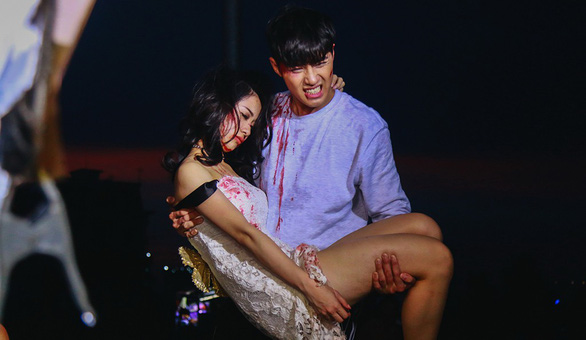A case where a famous Vietnamese pop singer was sued by a foreign musician for copyright infringement was the latest alarm to be sounded on the unprofessionalism of the country’s artists and entertainers when it comes to intellectual property protection.
Noo Phuoc Thinh, a pop star who has been in the show business for nearly ten years, is likely the first Vietnamese singer to be taken to court by an international artist, after the American musician Zack Hemsey and Epic Elite Company accused him of using their work without permission.
According to the lawsuit filed to the Ho Chi Minh City People’s Court, the 1988-born Vietnamese used a part of “The way,” which exclusively belongs to Epic Elite, in his latest music video “Cham khe tim anh” without their consent.
Hemsey filed his lawsuit when Thinh’s music video hit 30 million views on YouTube in October 2017.
At that time, Noo Phuoc Thinh and his team promptly admitted their infringement and replaced the original MV with a new one that removed the ‘illicitly-borrowed’ background music.
However, this action could not please the American musician as it failed to put an end to the problem when the original MV was already downloaded and reposted to different channels.
While the lawsuit is currently waiting for a final decision, a series of Noo Phuoc Thinh’s shows scheduled for this month were canceled following the scandal.
If the court finds Noo Phuoc Thinh and his team guilty in this lawsuit, the Vietnamese singer will have to execute the plaintiffs’ request to pay a compensation of nearly VND1 billion (US$43,000) and publicly send an apology to Zack Hemsey through media.

Other cases
Before Noo Phuoc Thinh, the MV “Song xa anh chang de dang” by Vietnamese singer Bao Anh had also been on the verge of being taken down from YouTube as it includes two pieces of music by Ivan Torrent.
Had it not been for her team’s quick reaction - adding credit to the author at the end of the MV, the Spanish composer would have sued them and the issue would not have simply stopped at a copyright charge of VND100 million ($4,300).
Back then in September 2014, the MV “Em cua ngay hom qua” by Vietnamese pop star Son Tung M-TP was the talk of the town, involving its piracy allegation.
The Vietnamese music industry’s 2014 phenomenon ‘disappeared’ from YouTube for one day upon the suspicion that it imitates the song “Every night” of South Korean girl group EXID.
Not only in the music industry, copyright infringement was also found in Vietnam’s film production.
Shortly after it hit the widescreen in August, the Vietnamese horror film “Loi nguyen gia toc” sparked controversy as viewers questioned if part of the song “Unchained melody” by American composer Alex North and lyricist Hy Zaret used in the movie had been legally bought from its owners.
Unprofessionalism
Addressing criticism, director Dang Thai Huyen and music manager, musician Viet Thanh, of “Loi nguyen gia toc” defended that only less than 30 seconds of the song appeared in the movie, according to Phu Nu Online (Women Online) newspaper.
“It must be 30 seconds or more to be considered piracy,” Huyen argued.
The response stunned many in the legal industry.
For instance, lawyer Le Quang Vy, said the rule, applicable for not only Vietnam but also the world, is “to use is to pay.”
“There’s nothing like using less than 30 seconds means free of charge,” the lawyer told Phu Nu Online.
“I remember one agency had to pay the price from the author’s request for using only ten notes of a song,” said composer Dinh Trung Can, general director of the Vietnam Centre for Protecting Music Copyright (VCPMC).
VCPMC signed agreements with a number of organizations on the protection of copyright that rule the uses of even one second of a song also incur charge, Can said.
A common thing of these incidents is that they prove the lack of professionalism in the entertainment industry in Vietnam.
In the Southeast Asian country, almost all music products are made by companies which are usually invested by singers themselves.
In other words, singers are to take all the responsibilities of their works, including legality, idea and copyright.
But it is worrisome that even the singers and their teams sometimes did not know that a product violated a copyright until they are sued.
In a discussion with Tuoi Tre (Youth) newspaper, Vietnamese musician Duong Cam advised singers and entertainers buy or get the licenses of songs before using them to avoid such unfortunate circumstances.
Like us on Facebook or follow us on Twitter to get the latest news about Vietnam!





















































